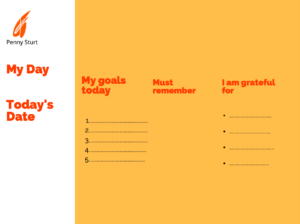Finding your way – Coping in the time of COVID-19
April 15, 2020 @ 12:46 pm
This is a short blog post with 3 main points designed to help you cope at what keeps being described as the strangest times of our lifetimes. Everyone has a slightly different challenge at present, so this is deliberately generalised. I am posting it on my website but will also be coming back to the issues on Twitter @practicematters and Facebook @pennyselfcare and am happy to discuss any points further. There are 3 main points I wish to make.
- Prioritise your well-being.
- Be realistic about managing your expectations of what you can do
- Stay connected to your emotional support group
1.Prioritise your wellbeing
Staying physically fit and emotionally well are essential. They may be bigger challenges now so think about how you can make sure you find time to exercise and eat healthily. Part of a coping mindset is to make the most of the opportunities that are available. If you are an adult at home with others, some of whom depend on you, then prioritising your own wellbeing is key to how well you all cope. The Government advice includes an expectation of ongoing exercise because it is such a key part of feeling ok about ourselves.
So top priority for managing your time is to exercise and have regular healthy meals. In my family we choose to exercise at different times, I like to start the day, and others prefer to end it, with exercise. My personal challenge is to make sure I complete 12,000 steps a day. One of my friends in the shielded category (no outside time) is running in front of the TV several times a day and beating me regularly to 30,000 steps. Others have run a marathon on their treadmill or in their garden. Many are doing #PEwithJoe or Yoga with Adriene. Some apps are free at the moment with exercise routines available that can be done in the home with no equipment. It matters less what you do, but that you do something that makes you out of breath and raises your heartbeat.
There are great benefits from going outside, so do take advantage of that time you are permitted to be out to notice the world around you which is changing daily. If you remember how important it is to you, and those you live with, to keep exercising, you will do it.
- Managing your expectations
Although this is useful advice in general, it is particularly important to pay attention to this at the moment. Set your own goals and notice when you achieve them. Make them realistic for your current situation and avoid using measures from a different time. If possible avoid comparison with others (on social media) and concentrate on what you are achieving. Making one of your goals doing your desired exercise and you will be in a positive mood quite quickly.
I find the method outlined below![]() helpful. What are my main goals for today and what am I grateful for/what was the best thing that happened? There is a space for the ongoing (things that have to be remembered) list but deciding what is your focus each day is useful. At times when I have been overwhelmed it might be my exercise, providing meals and getting a load of washing done. The emotional burdens we encounter will fluctuate but pay attention to what feels achievable each day and notice how you feel when you have ticked it off!
helpful. What are my main goals for today and what am I grateful for/what was the best thing that happened? There is a space for the ongoing (things that have to be remembered) list but deciding what is your focus each day is useful. At times when I have been overwhelmed it might be my exercise, providing meals and getting a load of washing done. The emotional burdens we encounter will fluctuate but pay attention to what feels achievable each day and notice how you feel when you have ticked it off!
What is also important is to notice the things you are grateful for about each day. Asking what the best thing was that happened in each day allows for those unexpected moments that give us joy to be really noticed and treasured. I am sure you are doing variations of this at meals/ in phone conversations as well; what was good about today, what was difficult, the good news / the bad news as methods of connecting; building our expectations of achievable goals and noticing what has brought us fun and joy.
- Staying connected
We are all finding new ways to be emotionally close while we are physically distanced. It is essential to make regular connections with the people who matter to you, whether family, friends or work colleagues. Who are the people you are missing and how do you make sure you still speak to them regularly? Someone said to me how nice it was to see a smiling face which I think is why we are moving to methods that allow us to see, as well as hear, each other. It’s important to notice those mutually supportive friendships and prioritise time to connect to them not just those you know require you to support them.
Social media and technology is helping us be creatively connected. I am constantly amazed at other people’s creativity; since being in lockdown I have taken part in virtual family quizzes, cocktail hours and Easter egg hunts, others have told me about their baking contests, bingo nights, pub quizzes and many more. I’m still trying to get the detail of how to play badminton virtually… Sometimes it’s helpful to have regular arrangements scheduled but there may be times and people who need to be spontaneously reached out to. We are all becoming proficient in online conference calling using a range of methods. My preference is Zoom as it works on all platforms/ range of devices and the app developers have quickly resolved the security issues. However find and use whatever works for you, your friends and family. Despite some understandable reticence all ages are sharing in online conference calling quite successfully when it becomes the best method for seeing those we love and want to remain connected to.
What now?
This was a brief post summarising the key factors for living well in these unusual times. There will be other ideas so please join in discussions on social media. If there are specific queries I can assist with I can be contacted using
@practicematters on Twitter and Penny Sturt Self-care trainer @pennyselfcare on Facebook.
My friend, Trudy Ritsema, IT Courses Dorchester is willing to assist anyone wanting advice about using their own technology or especially the new social media apps that are emerging. She is brilliant at sorting out glitches (by which I mean user errors!) and has helped behind the scenes in this blog.





